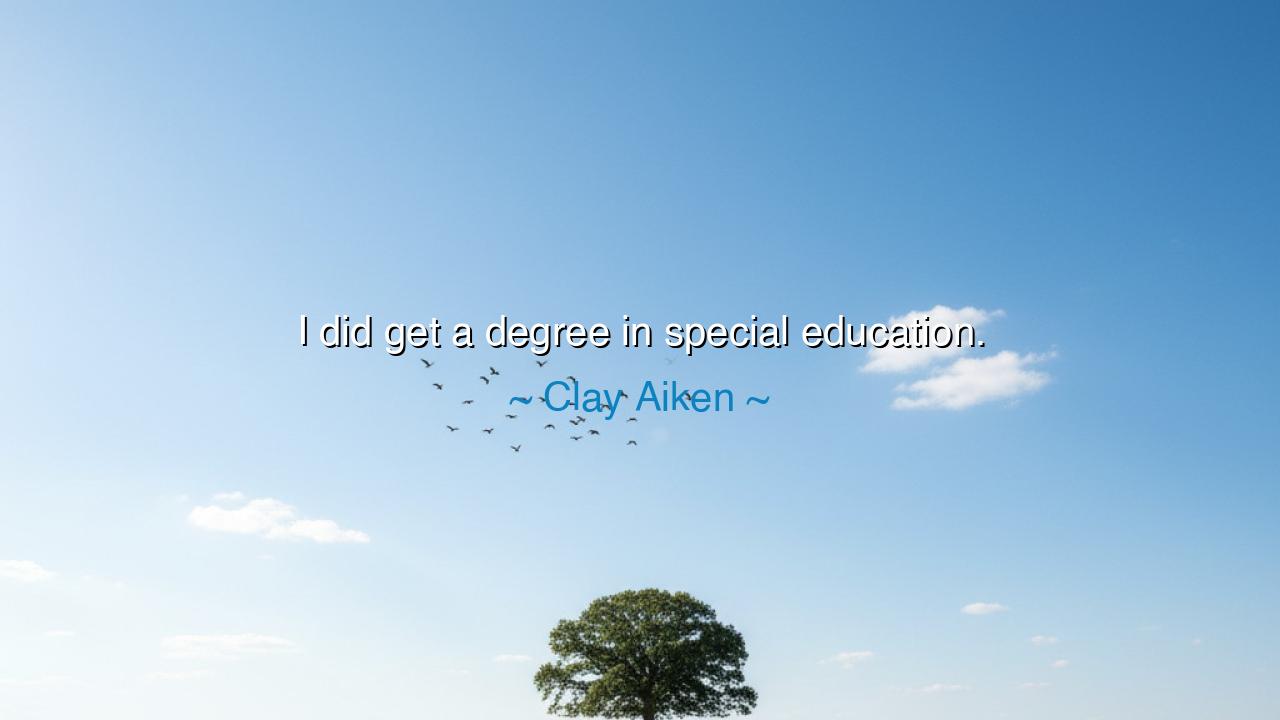
I did get a degree in special education.






The words “I did get a degree in special education” spoken by Clay Aiken may appear simple, yet beneath them lies a profound declaration of purpose, empathy, and commitment to the vulnerable. In these few words, Aiken reveals a dedication not merely to personal advancement, but to serving others and shaping lives that are often overlooked or marginalized. Special education is not a field chosen lightly; it demands patience, insight, and an understanding that teaching is not simply the transmission of knowledge, but the cultivation of human potential. Aiken’s degree is thus both a symbol of achievement and a testament to moral courage.
In the style of the ancients, one could compare this to the Stoics, who taught that virtue is the highest aim, and that the measure of a person lies not in wealth or fame, but in service and action. To earn a degree in special education is to commit oneself to this path of virtue, to devote time and energy to those whose needs are often invisible to the wider society. Aiken’s statement quietly conveys that true accomplishment is not measured solely in accolades, but in the lives touched and nurtured through knowledge, skill, and compassion.
The origin of this insight lies in Aiken’s own journey. While many may recognize him for his career in music and entertainment, his education in special education reflects a deeper calling: to empower those who face learning challenges, to advocate for their potential, and to ensure that no child is left behind. In earning this degree, Aiken aligned his intellectual and emotional faculties toward a purpose far greater than self-interest. He exemplifies the idea that knowledge, when coupled with empathy, becomes a force for transformation.
History is rich with figures who embody this principle. Anne Sullivan, the teacher of Helen Keller, dedicated her life to special education long before the field was widely recognized. Through patience, creativity, and unwavering commitment, she unlocked the potential of a child who could neither see nor hear, proving that the education of the marginalized is not only a moral duty but a profound testament to human ingenuity. Like Sullivan, Aiken’s pursuit of this degree reflects a similar devotion to enabling others to flourish.
This statement also reminds us that true education is never self-serving. Degrees in special education are not merely professional credentials; they are tools for societal betterment, instruments through which one amplifies the capacities of others. By stating, “I did get a degree in special education,” Aiken signals that his accomplishments are intertwined with responsibility, that the value of learning is measured not only by personal gain, but by the positive impact it yields for those in need.
Dear listener, the lesson is both moral and practical: seek knowledge that enables you to serve, that equips you to empower and uplift. Technical skill alone is insufficient; wisdom is best measured by its application in aiding others. A degree, any degree, reaches its highest purpose when it becomes a conduit for compassion, understanding, and tangible improvement in the lives of those we teach, guide, or mentor.
Take this lesson into your own life: pursue education deliberately, seek areas where your talents can create meaning, and prioritize empathy in your work. Whether in teaching, leadership, medicine, or art, the measure of success lies in the positive transformation of others’ lives, particularly those who are most vulnerable or overlooked. Aiken’s choice of special education reminds us that dedication to others elevates both the giver and the recipient.
Finally, let the words of Clay Aiken inspire action: commit yourself to learning that matters, and dedicate your skill to service. True accomplishment is not in recognition, applause, or fame, but in the quiet victories achieved when someone’s potential is realized through your guidance. A degree in special education is, therefore, more than a credential — it is a sacred instrument of empowerment, a call to purpose, and a lasting testament to the nobility of serving others.






AAdministratorAdministrator
Welcome, honored guests. Please leave a comment, we will respond soon